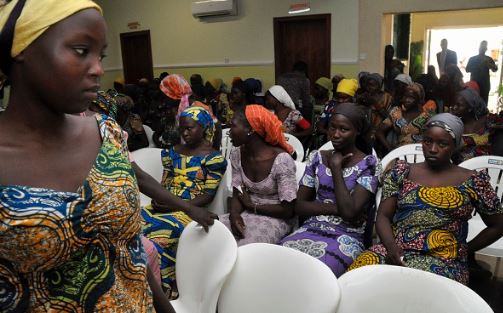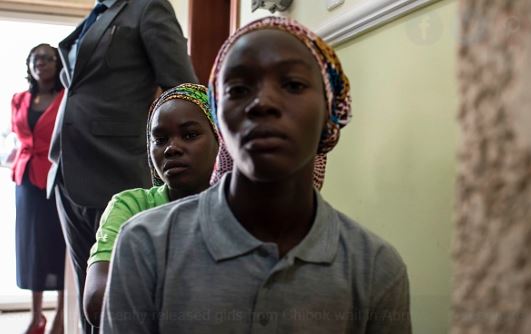
The 82 Chibok girls who were released on 6 May by the terrorist group Boko Haram in Nigeria, have not returned to their families yet, but are held in a centre in the capital Abuja for screening and rehabilitation.
However, Peter Pogu, father of one of the girls, was overjoyed when he learned that his daughter Grace was among them.
The lives of Peter Pogu and his family changed forever when his daughter was kidnapped, along with nearly 300 other girls, from the Chibok State Secondary School on 14 April 2014. In the years following her abduction by Boko Haram, a group that has been terrorizing north-east Nigeria since 2009, his body wasted away under the constant worry over Grace and the impact her kidnapping was having on his family.
During an interview in 2015, during which he could not stop crying for his missing daughter, he said: “We are wounded in our hearts. Our heads are in pain and our hearts are in pain always.”
His eight other children pressed him constantly for news of their sister. “In the morning [the children] will ask me, ‘Where is Grace? Up to now, you are telling us that she might come, but up to now she didn’t come … And we say, ‘She will come, she will come, she will come.’ One of my sons, Yakubu, is always telling me: ‘Baba, always you are going to some place, but you are not bringing Grace back to us. Why not?'”
But Pogu refused to give up hope, and on Tuesday the message came through: “Grace is out!”
As was also the daughter, Maimuna, of Yakubu Nkeki Maina, who’s a leader of the Chibok kidnapped girls parents’ association.

Grace, Maimuna and the 80 other girls’ release followed extended talks involving the Nigerian military, the Swiss government and the International Committee of the Red Cross (ICRC). The girls were set free in exchange for an undisclosed number (some reports indicate two, others indicate five) Boko Haram commanders. The exchange took place in Banki, Borno State, and from there the girls were flown to the state capital Maiduguri and then driven to Abuja to meet the President, Muhammadu Buhari.
The government published a list of names of the released girls on social media. Many parents do not have internet access, so some travelled the difficult and dangerous 890 km, 13-hour drive from Abuja to see for themselves.
Authorities have sent photos of the released girls to Chibok, so the painstaking verification of identities continues.
Government officials told media that most of the girls seemed to be in good condition and only one carried a baby boy under two years old.
Some freed girls will be confronted with distressing news: 23 parents have died since their abduction.
What’s next?
Presidential spokesperson, Femi Adesina, said: “The president promised that all that is needed to be done to reintegrate them into society will be done. He promised that the presidency will personally supervise their rehabilitation.”
“They will face a long and difficult process to rebuild their lives after the indescribable horror and trauma they have suffered at the hands of Boko Haram,” said Pernille Ironside, acting representative of UNICEF Nigeria.
The government has strictly controlled access to the previously released 21 girls. Most of the parents have seen their daughters on only two occasions, and this has invited criticism. Although there were reports that the previously released girls have started school in Abuja, it’s too early to know whether the newly released girls will join them.
The Nigerian government is strictly controlling access to the released girls. The international charity Open Doors, for instance, which has supported many of the families in the last three years – through food, medical and trauma care – told World Watch Monitor it does not expect to gain access any time soon, but remains in close contact with the parents.
Open Doors’ Director for West Africa, Jack van Tol told World Watch Monitor: “We rejoice with the Chibok families who, after such a long time, have finally heard the long awaited news of the release of their beloved daughter.”
About 100 girls’ whereabouts still unknown
Of the Chibok girls abducted in 2014, about 100 more girls are believed to still be in the custody of Boko Haram. Saturday’s group was the second to be released.
On 13 October 2016, Boko Haram released 21 girls, again due to Swiss government and Red Cross-brokered negotiations. Prior to this, on 5 November 2016, soldiers found Mary Ali Maiyanga in Pulka, a small village near the town of Gwoza in the far northeast of Nigeria. She had escaped with a 10-month-old baby.
On 18 May 2016, Nigerian soldiers discovered Amina Ali Darsha Nkeki (19) near Damboa, south of Maiduguri, with a four-month-old baby and her “husband” in the Sambisa Forest, the biggest hideout of Boko Haram.
47 Chibok girls escaped before, during or shortly after the abduction.
Boko Haram has been trying to establish a caliphate in the northeast of Nigeria since 2009. However, since the Nigerian army – with the help of regional forces – has started an offensive against them, the insurgents have lost a lot of their territory. But they continue attacks and mass abductions.
An estimated 2,000 other women, girls and young men have been kidnapped over the years.
Only last month, 7 April, they kidnapped 13 women near the village of Hambagda, near the border of Cameroon. Those abducted were among a group of 25 women who had gone to pick acacia fruit.
In late March, fighters loyal to the Islamic State-backed Abu Mus’ab Al-Barnawi faction abducted 18 girls from Pulka village, according to residents.
Van Tol warns that, in the euphoria over the release of the 82 girls, those who are still in captivity should not be forgotten: “Many more women, children and young men continue to face horrible circumstances at the hands of Boko Haram – such as forced Islamization, rape, beatings and being forced into carrying out suicide bombings. These captives do not enjoy the same media attention as the Chibok girls, or benefit from the efforts by the government to secure their release.”